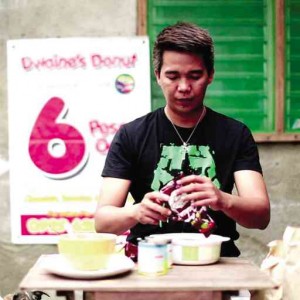New doors open for cop’s little venture
Eugene de Leon’s little venture—selling doughnuts to workers in an economic zone in Rosario, Cavite—has caught everyone’s attention.
He was recognized not only as a model policeman, who works clean for an extra living, but also because his helpers in his venture are victims of Supertyphoon “Yolanda.”
After the typhoon struck the Visayas in November 2013, families were forced to relocate and some of them went to Cavite. It was from these families that De Leon met 17-year-old twins, Jessah and Jhea Cañete, and Chris Jamora, 16, who helped him sell doughnuts.
“I couldn’t give them money or clothes because I didn’t have much of those either,” said De Leon, 31.
“So it must be something from which they could earn a little and ease their families’ burdens,” he said.
Article continues after this advertisementDe Leon every day ordered doughnuts from a local supplier in Manila. Once off duty, the young officer would set up a small table and sell them to Cavite factory workers. He sold each for P6 and every day earned about a thousand pesos, which he divided among the helpers and himself.
Article continues after this advertisement“That was only when I was off duty. But people in Rosario knew me as a cop so even when not in uniform, I was expected to respond to accidents or break fights as they happened in front of the doughnut stand,” he said.
This went on for a year, until in November last year when De Leon’s story was featured on a television program. When the supplier heard of this, the store owner raised the doughnut price, “because he said I was already famous,” De Leon said.
“We could not afford the new price to bring it in Cavite,” he rued. He had to temporarily stop the doughnut venture in January.
He then decided to start a different one.
De Leon entered the service in 2007 and earns at least P18,000 a month as a Police Officer 1 (PO1).
He finds his salary “just enough” then without the mandatory deductions.
When fellow policemen heard about his doughnut business, they were doubtful about it being profitable.
Rather than ‘kotong’
“To be honest, it’s not (profitable),” De Leon said in a phone interview. “I earned only P250 a day, just enough for the fuel of my motorcycle.”
“But it’s better than nothing, rather than (engage in) kotong (extortion),” he added.
De Leon, from Tondo, Manila, said he learned to work hard and clean from his parents: his father, a retired security guard and his mother, a street vendor.
He finished his information technology course while working in a fast-food restaurant in college.
Before he became a policeman, De Leon worked in a call center and in a digital photo shop, with salaries higher than his current pay as a policeman.
“Maybe it really is a matter of self-fulfillment and doing what I love,” he said when asked why he chose to be a policeman.
Having his sort of 15 minutes of fame did not change his simple lifestyle a bit. In fact, De Leon would not have retired his old, broken cellular phone if not for the prodding of his colleagues that he replace it with a more decent one.
He said he was still haggling with the doughnut supplier to roll the price back.
But at the moment, he is also keen on two new ventures—a rolling pulutan store, which he described as a pushcart selling cooked milkfish or squid on the street; and “boodle fight”-style eatery at tricycle terminals, that follows the military style of eating food laid on a long table.
“Of course they (the Yolanda survivors) will be a part of these (new) ventures,” he said.

